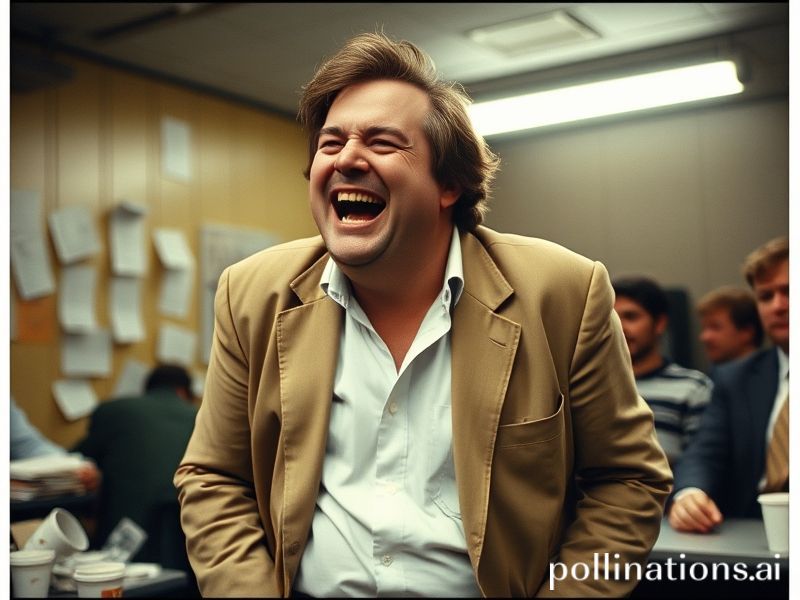Chris Farley: How a Sweat-Soaked Wisconsinite Became Planet Earth’s Unofficial Ambassador of Self-Destruction
Chris Farley: The Global Export Nobody Negotiated, Yet Everyone Signed For
By Our Correspondent in a Hotel Mini-Bar Somewhere East of the Dateline
Somewhere between the fall of the Berlin Wall and the rise of TikTok, a 300-pound Wisconsinite in a too-tight Oxford shirt became an unwitting instrument of soft power. Chris Farley—who once described himself as “the fat guy who falls down”—is now a cross-border cultural tariff no customs officer knows how to classify. From the neon karaoke booths of Osaka to the post-industrial pubs of Manchester (where “Matt Foley, Motivational Speaker” has replaced Churchill on ironic dartboards), Farley’s sweaty, red-faced panic has become a universal dialect. If you want proof that globalization is less about trade agreements and more about shared humiliation, look no further: the entire planet is now fluent in flailing.
How did a Second City alum who never held a passport outside North America achieve this dubious honor? Simple: the man was a walking, screaming violation of dignity, and dignity is the first thing every culture happily surrenders when no one’s filming. In France, intellectuals cite his “Laurel & Hardy via cheese-curd” physicality as proof that America’s true contribution to world heritage is self-inflicted slapstick. In South Korea, binge-drinking millennials recite his SNL Chippendales sketch like Buddhist koans—proof that anxiety, when choreographed, can be oddly meditative. Even the Swiss—who usually require a referendum to change breakfast cereal—have adopted “Down by the river” as shorthand for any career about to plunge into alpine cold water.
The darker punchline is that Farley’s death in 1997, at age 33, became its own transnational cautionary tale. While American headlines wrung hands about excess, foreign tabloids translated the tragedy into tidy moral arithmetic: one part talent, two parts cheese fries, endless refills of loneliness. Overnight, rehab brochures in Prague started featuring his gap-toothed grin under the words “Don’t Let This Happen to You (Again).” In Argentina, where economic collapse was already a national sport, Farley’s flameout provided a convenient metaphor: another bloated neoliberal experiment that couldn’t stick the landing.
Yet the corpse keeps touring. Streaming algorithms—those joyless curators of human attention—have made Farley posthumously ubiquitous. Netflix Japan promotes “Tommy Boy” like it’s a new Studio Ghibli drop; Amazon Prime Germany bundles “Black Sheep” with documentaries on the fall of the Weimar Republic, presumably to highlight thematic continuity in chaos. Even the Chinese internet, which usually censors anything funnier than a tax form, allows pirated clips on Bilibili because regulators can’t decide whether he’s subversive or merely pathetic. The result is a billion-person focus group stuck between laughter and secondhand embarrassment—essentially the human condition with better Wi-Fi.
What does it say about our planet that a man whose finest artistic moment involves crushing a tiny coffee table is now a shared geopolitical reference point? Perhaps that comedy, unlike democracy or decent coffee, actually travels well. It doesn’t require translation, only recognition: the universal fear of being too loud, too large, too much. Farley’s genius was turning that fear into a contact sport, then apologizing mid-tackle. The rest of us, scattered across time zones and tax brackets, watch and think: “There but for the grace of a functioning cardiovascular system go I.”
So raise a lukewarm mini-bar whiskey to the accidental ambassador of imperfection. In a world busy weaponizing every word, gesture, and molecule, Chris Farley remains the rare export that explodes on arrival yet somehow leaves everyone lighter. The receipts are still being tallied in every language that has a word for “oops.” Bottom line: the planet is now one giant van down by the river, and we’re all just trying not to fall through the floorboards.







